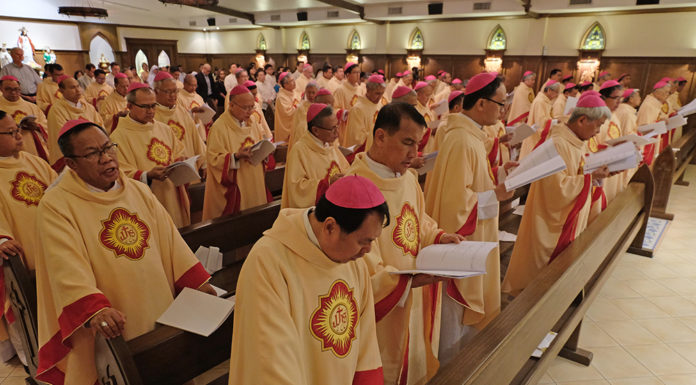 UNIVERSITY Rector Fr. Rolando V. de la Rosa, O.P. has lamented the erosion of correct conscience amid today’s fashion of invoking freedom of choice and freedom of conscience to justify self-interest and individualism.
UNIVERSITY Rector Fr. Rolando V. de la Rosa, O.P. has lamented the erosion of correct conscience amid today’s fashion of invoking freedom of choice and freedom of conscience to justify self-interest and individualism.
Delivering this year’s Jose Rizal Lecture of the Philippine Center of the International PEN (Poets and Playwrights, Essayists and Novelists) at the Cultural Center of the Philippines, De la Rosa warned that the loss of conscience has resulted in moral confusion and, in the case of government, corruption and buck-passing. (Read text of lecture)
Referring to the “fertilizer scandal” hearings in the Senate where former agriculture undersecretary Jocelyn Bolante is being grilled for disbursing more than P700 million during the 2004 election to non-agriculture legislative districts, the Rector said “the main actor . . . keeps saying: ‘My conscience is clean.’” He added that those pushing for constitutional change to perpetuate themselves in power “also claim that they are doing that ‘in conscience.’” Ditto with supporters and opponents of House Bill 5043, the Reproductive Health Care Bill.
De la Rosa warned that conscience “has somehow suffered a depreciation of meaning and value.”
While saying that conscience is “the subjective norm of what is right or wrong,” De la Rosa said “subjective should not be taken in an absolute sense.” He quoted Cardinal John Henry Newman: “Conscience has rights because it has duties. But in this age, conscience has been superseded by a counterfeit: the right of self-will.”
The Rector explained: “Newman’s words remind us that we often equate what we want with the urgings of conscience. Today, who are the mothers of decision-making of our youth? More often than not, it is the hedonist Faust who celebrates his day by seeking gratification in the here and now, who thinks that he only lives once, therefore he must get what he wants at whatever and whoever’s expense, even it means the ruin of generations and the destruction of the environment.”
He explained that the deterioration of conscience and its equation with self-will and individualism has been abetted by “modern psychology’s absolutization of choice and the media’s reliance on surveys and statistics as the sole standard of right and wrong.”
He said because of psychology’s exaltation of choice, “very few would like to take personal and collective accountability when such a choice proves to be wrong.”
He said despite sea mishaps because of overloaded vessels, despite poorly built subdivision houses crashing on their occupants at the slightest meteorological disturbance, despite killer floods and landslides as a result of deforestation, the people have yet to see government officials own up to their mistakes.
De la Rosa stressed that conscience “must be molded according to objective rules and laws.” He called for moral education and the proper formation of conscience.
“A well-formed conscience tells us that right is right even if nobody is right; wrong is wrong even if everybody is wrong,” De la Rosa said.
But the Rector said conscience-formation “does not happen in a vacuum.” He explained it is developed through “human experience, individual and collective.” He deplored that many young Filipinos belong to what has been described by Time Magazine as a “motherless generation”—that is, children whose mothers are overseas workers and are parental absentees.
He added that the motherless youth are also bombarded by consumerist values. “With money from abroad, Filipinos, especially the youth, become members of the mystical body of consumers who are saved from bad breath, dandruff and pimples. Consumerism has become a form of eschatology, technology is its rubric, television, movies and advertisements provide the rituals.”
Rizal’s intellectual honesty
De la Rosa likened the moral formation of a correct conscience to Rizal’s struggles.
He said that Rizal has often been portrayed as having broken off with the Catholic Church as a matter of conscience. But Rizal’s intellectual honesty upheld the Church’s teachings on truth-seeking and reconciling faith and reason, the Rector said. He explained Rizal did not imbibe liberal enlightenment ideals uncritically.
“In fact, with his firm belief that the truth of reason cannot contradict the trust of faith, he gave us a model of a man who lives according to his conscience,” the Rector said.
De la Rosa said he agrees with the late Nick Joaquin, National Artist and a UST man of letters, in the latter’s biography of the national hero that Rizal did retract and returned to the Catholic faith before he was executed (the retraction has been called a sham by liberals).
De la Rosa, quoting Joaquin, said Rizal did not really make a retraction because there was no need to: “. . . a retraction in no way demanded a surrender of the intellect, only a renewal of the heart.”
De la Rosa urged writers and other leaders “to learn from Rizal’s sublime example of intellectual honesty and freedom of conscience.”
The Jose Rizal Lecture was the high point of the 51st congress of the Philippine PEN, the local chapter of the PEN international federation of writers that promotes freedom of expression and the rights of writers. The Philippine PEN was founded by National Artist F. Sionil Jose, a loyal UST alumnus.
Rizal lecturers in the past include Jovito Salonga, Claro M. Recto, and Eugenia Apostol.
Congress patrons this year included the UST Varsitarian, UST Publishing House, National Bookstore, De la Salle University, Alfonso Yuchengco Foundation, SM Malls, Solidaridad Bookshop, and Sen. Edgardo Angara.














